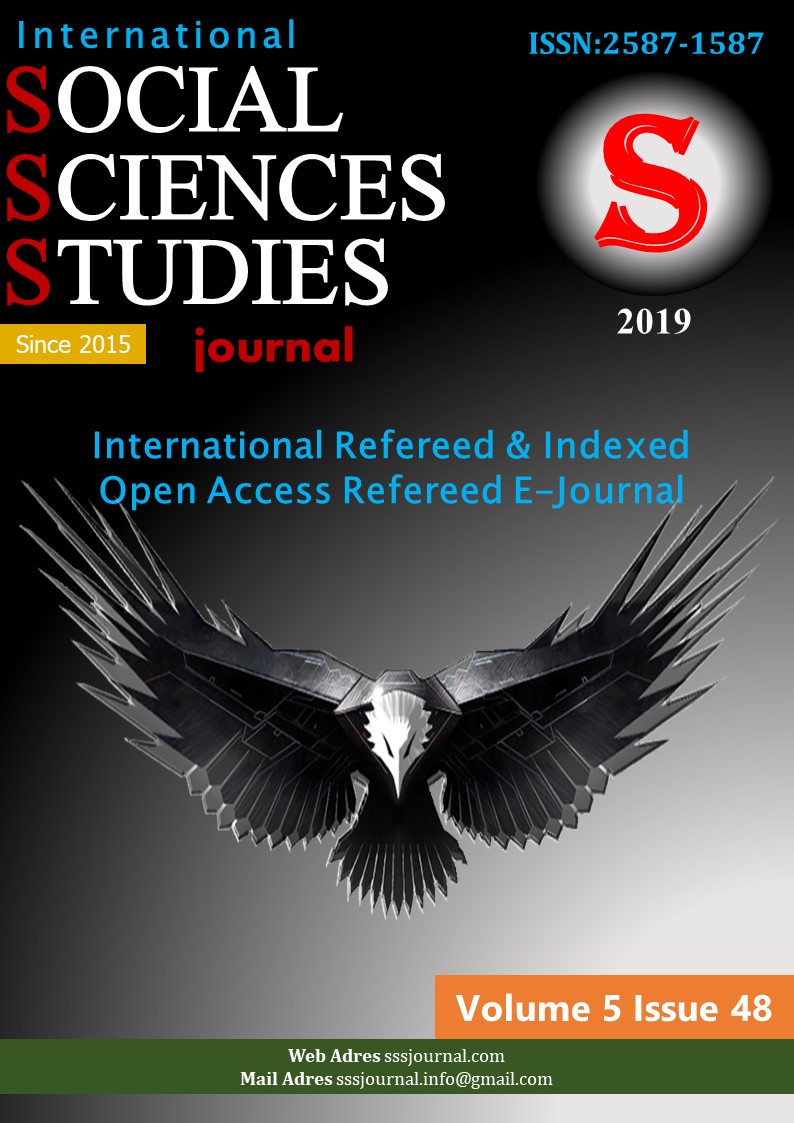Author :
Abstract
Turistik deneyimlerin bilişsel edinim bağlamında nasıl bir rol oynadığını keşfetmeyi amaçlayan çalışma kapsamında nitel araştırma yöntemlerinden çoklu durum çalışması tekniği ile araştırma yürütülmüştür. Oluşturulmuş olan yarı yapılandırılmış mülakat sorularının, maksimum çeşitlilik örneklemesi dâhilinde gerçekleştirilen kırk beş yüz yüze görüşme kapsamında değerlendirilmesi yoluyla veri elde edilmiştir. Verilerin kodlanmasından, durum/vaka modelleri temelinde ilişki haritalarının oluşturulmasına kadar içerik analizi yapılmasını kolaylaştıran tüm analiz işlemleri, nitel ve karma yöntemler için bilgisayar destekli bir veri analiz programı olan MAXQDA Analytics Pro v.18.2 aracılığıyla tamamlanmıştır. Sonuç olarak; turistik deneyimlerin bilişsel anlamda özellikle önemli düzeyde bilgi edinimine imkân tanıdığı, bireylerin profesyonel ve günlük yaşamları üzerinde şekillendirici olan meslek tercihiden, yaşanılacak yerin tasarlanmasına kadar gelecek yönelimlerini etkileyebildiği ve tatil anlayışlarını tekrar değerlendirmeye açmak suretiyle mevcut tatil pratiklerinin sorgulanarak gözden geçirilmesine zemin hazırladığı tespit edilmiştir. Bununla birlikte doğaya, kültüre, insana bakışı farklılaştırmak ve kökeni bilgi boşluklarıyla ilişkili olan stereotipler ile önyargıların aşılmasına yardımcı olmak çerçevesinde bakış açısının genişlemesinde kayda değer bir rol oynayabildiği ortaya konulmuştur. Genel olarak değerlendirildiğinde; bilişsel edinim sağlanması hususunda turistik deneyimlerin göz ardı edilemeyecek çok boyutlu bir yön içerebildiği anlaşılmıştır.
Keywords
Abstract
A qualitative research method was used to conduct research that aims to explore what kind of roles touristic experiences play on cognitive acquisition through the instrument of multiple case studies. Data were obtained by utilising the conducted forty-five face-to-face interviews via formed semi-structured interview questions within the maximum diversity sampling. All analysis processes that are facilitating to perform content analysis from coding the data to creating relationship maps on the basis of cases/case models were completed via a computer-aided data analysis program for qualitative and mixed methods, MAXQDA Analytics Pro v.18.2. In conclusion; it is determined that touristic experiences enable -in particular- knowledge acquisition significantly, can effect on future orientation from profession preference which is both professional and daily life-shaping to designing/envisioning a place to live in future and establish a ground to review and question current vacation practices by means of opening vacation conception for reconsideration. In addition to this, it can play a noteworthy role on expansion of perspective within the frame of differentiating the personal view of nature, culture, human and assisting to overcome both stereotypes and prejudices whose origins are associated with information gaps. When it is come to approach the study in general; it is understood that touristic experiences can have a multi-dimensional side that cannot be ignored with regard to obtain cognitive acquisition.
Keywords
- Barrios, M. Borrego, A., Vilaginés, A., Ollé, C., & Somoza, M. (2008). A bibliometric study of psychological research on tourism. Scientometrics, 77(3), 453-467.
- Cohen, E., & Cohen, S. A. (2012). Current sociological theories and issues in tourism. Annals of Tourism Research, 39(4), 2177-2202.
- Cohen, E. (1984). The sociology of tourism: approaches, issues, and findings. Annual Review of Sociology, 10, 373-392.
- Cohen, S. A. (2010a). Chasing a myth? Searching for ‘self’ through lifestyle travel. Tourist Studies, 10(2), 117-133.
- Cohen, S. A. (2010b). Personal identity (de)formation among lifestyle travellers: a double-edged sword. Leisure Studies, 29(3), 289-301.
- Cohen, S. A. (2010c). “Searching for Escape, Authenticity and Identity: Experiences of ‘Lifestyle Travellers’” (Eds. M. Morgan, P. Lugosi, and J. R. B. Ritchie), The Tourism and Leisure Experience: Consumer and Managerial Perspectives, 27-42, Channel View Publications, Bristol.
- Desforges, L. (2000). Traveling the world: identity and travel biography. Annals of Tourism Research, 27(4), 926-945.
- Erkuş, A. (2012). Psikolojide ölçme ve ölçek geliştirme-I: Temel kavramlar ve işlemler. 1. Baskı, Pegem Akademi, Ankara.
- Grunewald, R. A. (2002). Tourism and cultural revival. Annals of Tourism Research, 29(4), 1004-1021.
- Kim, K., Uysal M. & Sirgy, M. J. (2013). How does tourism in a community impact the quality of life of community residents?. Tourism Management, 36, 527-540.
- King, B., Pizam A., & Ady M. (1993). Social impacts of tourism: host perceptions. Annals of Tourism Research, 20(4), 650-665.
- Larsen, S. (2007). Aspects of a psychology of the tourist experience. Scandinavian Journal of Hospitality and Tourism, 7(1), 7-18.
- Light, D. (2001). ‘Facing the future’: Tourism and identity-building in post-socialist romania. Political Geography, 20, 1053-1074.
- Noy, C. (2004). This trip really changed me: backpackers’ narratives of self-change. Annals of Tourism
- O’Reilly, C. C. (2006). From drifter to gap year tourist: mainstreaming backpacker travel. Annals of Tourism Research, 33(4), 998-1017.
- Pearce, P. L. (2010). New directions for considering tourists’ attitudes towards others. Tourism Recreation
- Pearce, P. L., & Packer, J. (2013). Minds on the move: New links from psychology to tourism. Annals of Tourism Research, 40, 386-411.
- Pocock, N. J., & McIntosh, A. J. (2011). The return from travel: a new beginning?. Current Issues in Tourism, 14(7), 631-649.
- Richards, G. (2015). The new global nomads: Youth travel in a globalizing world. Tourism Recreation
- Uriely, N., Yonay, Y., & Simchai, D. (2002). Backpacking experiences: A type and form analysis. Annals of Tourism Research, 29(2), 520-538.
- Volo, S. (2009). Conceptualizing experience: A tourist based approach. Journal of Hospitality Marketing & Management, 18, 111-126.
- Week, L. (2012). I am not a tourist: Aims and implications of ‘traveling’, Tourist Studies, 12(2), 186-203.
- White, N. R., & White, P. B. (2004). Travel as transition: Identity and place. Annals of Tourism Research, 31(1), 200-218.
